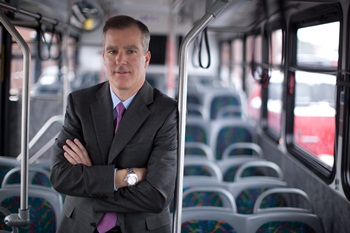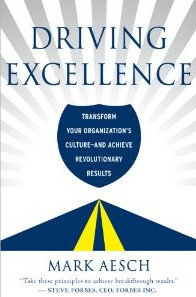
Mark Aesch, CEO of the Rochester Genesee Regional Transportation Authority, hopes his new management book, "Driving Excellence," will inspire other transit systems to perform at a higher level.

Mark Aesch's new book, 'Driving Excellence,' describes his efforts to transform a faltering transit system into a model of success using data-driven decisions and creative leadership.
These are exciting times for Mark Aesch, chief executive of the Rochester Genesee Regional Transportation Authority in Rochester, N.Y.
His book, "Driving Excellence: Transform Your Organization's Culture — And Achieve Revolutionary Results," was released on Feb. 1, and he's been doing promotional interviews with radio and TV outlets, as well as newspapers and magazines. He's also been monitoring the sales of the book daily, with the understandable hope that it will climb the charts of the best-seller list.
In his 239-page book, Aesch chronicles his tenure at the transit system, which began in 2004, and his efforts to transform the finances, culture and morale of the organization by installing a business model based on private-sector principles and a "culture of no ego."
Aesch describes in gritty detail some of his run-ins with union leaders, nay-saying employees and local politicians. Although he doesn't name names, Aesch will likely not be invited to holiday meals by his managerial predecessors at RGRTA, whom he says helped saddle the authority with deep deficits and flagging morale due to short-sighted decisions and inflexible thinking.
To better understand Aesch's motivations for writing the book, Transit Talent's Steve Hirano spoke with him by phone on Feb. 2, the day after the book was released.
What prompted you to write this book?
Mark Aesch: I wrote the book to offer public-sector managers to see that there's a different way to provide management other than the traditional "just increase expenditures by X% per year." That you really can introduce private-sector ideology into providing a public-sector service.
And how did you get started?
Normally, you first link up with an agent. If the agent thinks your concept is worth consideration, you put together a book proposal, which is an approximately 70-page document outlining to potential publishers what the book will be about. Then you submit the proposal to the major publishing houses, typically in New York City. And you hold your breath and look to see if any white smoke comes up.
And, obviously, in your case it did.
It was astonishing. I had interest from four major publishing houses, and three of them actually got into a competitive situation for the rights to publish the book.
How long ago did that happen?
That was in October 2009. I still refer to it as the most exciting day of my life. It's pretty cool for a farm kid to be on the top floors of buildings in Manhattan. You don't think you're going to hear from anybody, much less have four different organizations interested in the book. It was incredibly exciting.

'Driving Excellence,' published by Hyperion, was released on Feb. 1. Author Mark Aesch said he started writing the book more than four years ago, two years before he secured a literary agent.
So you got an advance for writing the book?
Yes, we did get an advance for the book. I was obviously thrilled with that, but I didn't go into this project for the money. I really wrote the book to serve as a tool for public-sector managers.
How long did it take to write the book?
I began the process about two years before I approached the agent. The process from when I approached the agent until when the book was released yesterday [Feb. 1] was about two years.
It ended up being a useful two years because the material was helpful going forward, but the traditional way you do it is to come up with a concept and approach an agent and see if someone will represent you. In fairness, if I had not put the time in for the two years leading up to when I found my agent, I'm not sure he would have taken the project.
Do you enjoy writing in general?
I do enjoy writing very much. But the reason I did the project, as I said earlier, was because I wanted it to be a tool to inspire people. That it is possible, in our case, to cut fares, run surpluses and reduce reliance on taxpayer dollars. That you can do it in school districts, in counties and states. And there's nothing unique in what we did here.
What was the most difficult part of the writing process?
The hardest part of writing the book was the editing of it. I was contractually obligated to provide a draft of the book in the middle of May last year, and what we wound up actually publishing was about a third less than what I concluded should be the book back in the middle of May. It was just so painful to go through that process of stripping out that third of the book.
Do you feel like you left out parts that should have stayed in?
I made the decisions about what stayed in and what came out, so I'm comfortable with that. But it's just a very painful process to go through. There's nothing that we cut that I didn't believe in cutting.
How do you think it will be received by your colleagues in the transit industry?
I'm hopeful that when my colleagues in the industry read it, they'll see that it's a public-sector management book that uses public transportation examples to makes its points. And I'm hopeful that they'll be really proud that our industry gets to be portrayed as knowing how to provide public-sector management in a very efficient fashion. My hope is that people will be excited that our industry is being put in such a positive light.
Do you think, though, that some people will say, "Why is this guy telling people how, in many cases, he's been able to do something that we haven't been able to do?"
I think some folks could view it that way, but my hope would be that people would look at it and say, "That's a different way of looking at it. Maybe there are some concepts here that would allow us to make some changes and maybe allow us to talk with elected officials in a different way. Or to manage our board in a different way. Or to interact with our employees in a different way." My hope would be that people might find some tools in the book as opposed to thinking that we wrote in a way that we were talking at them, rather than with them, about how we can all perform at a higher level. That's certainly how I read a book.
You mention several RGRTA employees by name in the book. Do you expect any fallout from these behind-the-scenes revelations?
I expect there are some things in the book that will make some folks uncomfortable. In most cases where I included a name, they ended up being heroes. The bus driver, for example, early on in the book. It's a challenging story that we tell initially, and then later in the book you can see he winds up being a hero. Similarly, with a guy who worked cleaning the buses. It was a challenging interaction. Then, later in the book, he winds up becoming a hero. In most situations, the employees that we mention by name help to demonstrate the cultural change that we were looking to bring about.
Do you think that most of the transit systems in the U.S. can apply the principles that you've applied and be able to turn things around the way you did?
I think the way we've managed the transit system in Rochester is not unique to the Rochester transit system. It's also not unique to the transit industry. I think very much that this is a model of management — I call it "destination management" — that can be used at school districts, hospitals, water systems and even counties and entire states.
Are you promoting the book through a tour or other type of marketing program?
I've done a number of radio and TV appearances. The publisher is doing paid advertising as well. We're hopeful that the transit industry itself will be supportive and excited that our industry is being held up as a model for public-sector management.
In December, you announced that you're going to be leaving RGRTA at the end of this year. What are your plans?
A lot of it will be determined by the success of the book. If the book takes off and begins to be a model for public-sector management, then that might take me in one direction. If the book is modestly successful, I'll take another look at things. If we sell only seven copies, I'm going to wind up pumping gas somewhere [laughs]. I knew that I was going to leave the authority at the end of 2011, and I just wanted to give the board lots of time to transition to a new leadership. It's a year of transition for me as well into what I'm going to do next.
Do you think you have another book in you?
I couldn't have imagined as a kid growing up shoveling cow manure until I was 20 years old that I would ever write one book, so you know that I hate to say that I couldn't write two. There's no plan for a second, but I guess we'll see.
"Driving Excellence," published by Hyperion, can be found at major book stores such as Barnes & Noble and Borders and through their online sites. It can also be ordered through Amazon
Sign up for Transit Intelligence
News and commentary in public transportation, and the latest job postings and solicitations.
Daily News Briefing
- Could CEO's plan actually save California’s high-speed rail project?
- U.S. Supreme Court to decide whether NJ Transit can be sued in other states
- New York City mayoral candidate Zohran Mamdani’s win has put buses in the spotlight. Should they be free?
- Opinion: Why the MBTA’s electric bus mandate is a bad idea
- North County Transit District bus drivers return to transit agency as in-house employees
- San Francisco MTA worker allegedly faked job title to get Giants, 49ers tickets and other freebies
- Golden Gate Bridge, Highway and Transportation District rescinds DEI resolutions, fearing loss of federal funds
- Milwaukee County transportation executive director steps down following MCTS audit request
- Drugs and crime are plaguing a Minneapolis transit station. Neighbors say there’s only one option
- SEPTA's fare evasion crackdown is no joke. Ask the more than 3,200 people criminally charged this year
- Spokane Transit Authority confirms Karl Otterstrom is sole finalist for CEO
- Milwaukee County Transit System announces surprise deficit, prompting county audit
- Results of 2023 Transit Agency Salary Survey
- Sign Up for the Transit Intelligence Newsletter for Industry News, Job Listings and Public Notices

